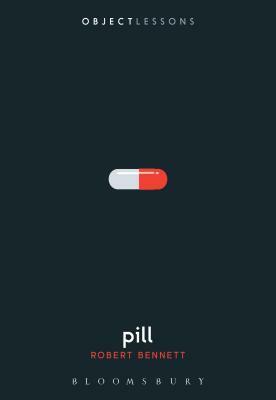
Pill
by Robert Bennett
Genres: Non-fictionPages: 176
Series: Object Lessons
Rating:

Synopsis:"You are what you eat." Never is this truer than when we use medications, from beta blockers and aspirin to Viagra and epidurals-and especially psychotropic pills that transform our minds as well as our bodies.
Meditating on how modern medicine increasingly measures out human identity not in T. S. Eliot's proverbial coffee spoons but in 1mg-, 5mg-, or 300mg-doses, Pill traces the uncanny presence of psychiatric pills through science, medicine, autobiography, television, cinema, literature, and popular music. Robert Bennett reveals modern psychopharmacology to be a brave new world in which human identities- thoughts, emotions, personalities, and selves themselves-are increasingly determined by the extraordinary powers of seemingly ordinary pills.
I usually enjoy the Object Lessons series, but they’re pretty varied in what they contain — the best (in my views) as the ones that act as microhistories, looking at the development of a thing, what it means to people, etc. Pill doesn’t really do so, though: it does try to explore what a particular type of pill (psychiatric medication) has meant to people, without much of the scientific/medical side of things. Largely, Bennett spends the time recounting the events of TV shows, books, etc, with a minimum of actual commentary. The character did this, then that; another character said this about it; this is how things ended.
It’s really boring to read, and it doesn’t help — for me — that Bennett’s obviously deeply ambivalent about the use of psychiatric drugs, but uses these fictional examples as if they’re truths. They aren’t. Fiction is fiction. And yes, sometimes it reflects reality and comments on reality (and medication in real life can have side effects, or not work, etc), but Bennett seems in danger of forgetting that the characters aren’t real, and their struggles aren’t real.
He reveals in the last chapter that he has bipolar disorder himself, describing some of his manic episodes, but clearly yearning for them as well. Psychiatric medication, he believes, changes his personality, mutes his creativity, etc. You can tell by reading that he’s within an ace of unprescribing himself from his own medication — and by his own admission, chaos will undoubtedly ensue if he does.
All in all, the book is more of a summary of various movies involving psychiatric conditions, followed by a confession of instability and uncertainty on the part of the author. The final chapter alone feels a lot more worthwhile than the regurgitated plots, though it’s inconclusive and perhaps not quite coherent.
Rating: 1/5

Leave a Reply